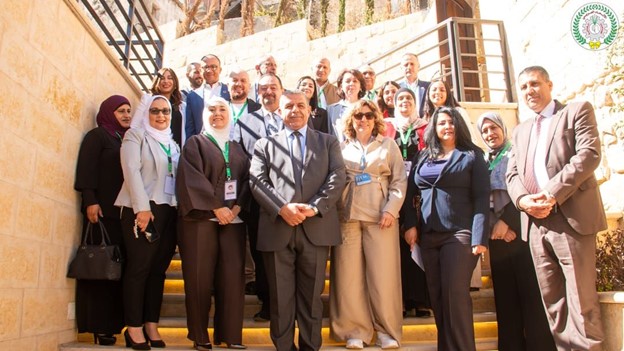FAO and AFFI advance regional efforts to safeguard traditional foods in the Arab Region

©FAO
The Food and Agriculture Organization of the United Nations (FAO), in collaboration with the Arab Federation for Food Industries (AFFI), held a regional consultation event titled “From Heritage to Plate: Encyclopedia of Traditional Foods in Jordan and Lebanon” to present the outcomes of the activities conducted by the organization for mapping traditional foods across said countries.. The consultation brought together government representatives, academics, civil society and food and nutrition experts to discuss the preservation, documentation, and policy integration of traditional foods as part of sustainable food systems.
Hosted at Beit Sheikh Falah Al-Hamad in Al-Salt, the event marked a milestone in the broader FAO–AFFI initiative on documentation and mapping of traditional foods in the Arab Region, which aims to safeguard the region’s culinary heritage and leverage traditional food knowledge for nutrition and sustainable development.
In their opening remarks, Nabil Assaf, FAO Representative in Jordan, and Hayssam Jaffan, President of AFFI, underscored the cultural and nutritional value of traditional foods and the need for collective action to protect them. They highlighted that traditional foods extend beyond recipes as they embody identity, heritage, and social history, serving as a link between generations and as a key foundation for healthier diets.
The Arab region’s rich and diverse culinary heritage has evolved through centuries of cultural exchange, trade, and agricultural adaptation. However, globalization, urbanization, and changing consumption patterns have increasingly threatened the continuity of traditional food practices, leading to nutritional challenges, local supply chain disruptions, and the erosion of local food knowledge. The Arab Encyclopedia of Traditional Foods, developed for Jordan and Lebanon, represents a pioneering step toward documenting these practices and integrating them into future food and nutrition policies.
The first session, “Conceptualizing Traditional Foods,” moderated by Moustapha Mohamed, Food Safety and Quality Officer at FAO’s Regional Office for the Near East and North Africa (RNE), explored different conceptualizations of traditional foods and their contribution to cultural heritage, sustainability, and resilient food systems. One key takeaway from the session included the challenge of conceptualizing traditional foods as there is no clear agreed-upon definition. Panelists Fatima Hachem (FAO Nutrition and Food Systems Division), Bassel Daher (FAO RNE), and Magdy Elsayed (National Research Center, Egypt) emphasized that preserving traditional foods supports local economies, reduces food loss, and strengthens community resilience.
This talk was followed by “Mapping and Assessment: Traditional Foods Case Studies (Jordan and Lebanon),” moderated by Fadi Jaber, Secretary-General of AFFI. The session presented key findings from the Arab Encyclopedia, including documentation of regional food practices and insights from fieldwork in Jordan and Lebanon. Speakers Nada Nehme, Moawiya Haddad, Jihane Karameh, Suad Azar, and Sobhia Saifan discussed how local communities are maintaining food traditions despite modern pressures.
In the afternoon, “Practical Applications: Showcasing Experiences and Initiatives,” moderated by Faten Adada, Agriculture and Rural Development Expert at FAO RNE, featured presentations by Nico Dingemans (Hospitality in Health), Hussein Hassan (LACODE, Lebanon), and Nehal Sameh (National Research Center, Egypt). The speakers shared examples of initiatives promoting traditional foods in education, food safety, and local markets. This session was especially informative for showcasing how the already existing efforts of mainstreaming traditional foods and its relevance in achieving sustainable and inclusive agrifoods systems transformation.
The final Mobilization Session, moderated by Wafaa Ramadneh, FAO Programme Assistant, focused on defining potential stakeholders and identifying policy entry points better integrate traditional foods into national development agendas. Participants discussed the role of international trade in impacting local production of ingredients associated with traditional foods while Hania Chahal highlighted the different barriers that surround the accessibility and interest of traditional food products. Aicha Saad (AWEDCP – Morocco) and Amjad Al Rashaydeh (JFDA) discussed policy opportunities to strengthen traditional food industries, including geographical indicators and alternative certification standards, to promote healthier, more sustainable consumption patterns.
In her closing remarks, Fatima Hachem, Senior Nutrition Officer for FAO reaffirmed the commitment to advance the documentation and promotion of traditional foods across the Arab world, emphasizing that protecting culinary heritage is key to achieving sustainable and resilient food systems. The roundtable concluded with a shared understanding that traditional foods are not only a cornerstone of Arab identity, but also a pathway toward better nutrition, stronger rural economies, and more sustainable futures for the region.
